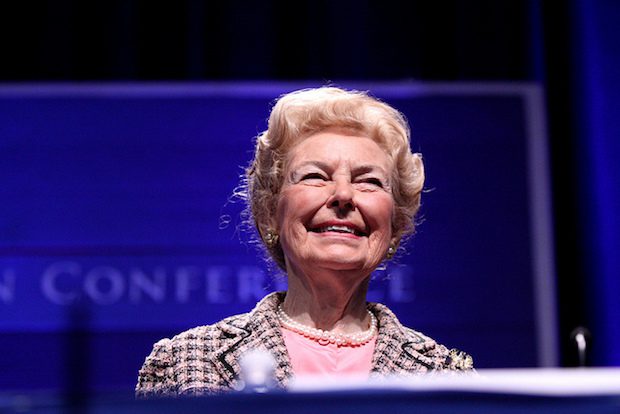Needed: Phyllis Schlaflys For Religious Liberty

The Atlantic has a piece by Kate Klonick up, paying tribute to Phyllis Schlafly — this, though Klonick’s politics are opposed to Schlafly’s. Excerpt:
As states were busy ratifying [the Equal Rights Amendment], Schlafly was setting up a movement that would help put an end to that honeymoon. Many look at Schlafly as a defender of femininity; a 1950s housewife who staged rebellion to save her breed. She was anything but. Schlafly was a veteran of politics with years of elite education and political experience (though little of it successful) to build on: She was an honors graduate of Washington University in St. Louis and a masters program at Radcliffe. She twice ran unsuccessfully for United States Congress. She authored dozens of political (some might say conspiratorial) books and she was active in national Republican politics for decades before picking up the STOP ERA mantle.
Few that joined her STOP ERA cause could match her resume. That day from across her desk, she described her volunteers as “housewives” who “didn’t even know where their state capital was.” She taught them how to give STOP ERA talking points at their local representative’s office and she taught them how to send thank you notes afterwards. She taught them how to wear the “right colors for television,” and style their hair and makeup so that all STOP ERA representatives looked the same—looked like her. She held seminars where she played videos of herself speaking and would have them mimic her ability to give “20-second sound bites.” She taught them to stay on message. She taught them how to smile.
This tribute jumped out at me because I recently talked with a political activist who is involved in the religious liberty fight. I asked him what ordinary people could do. One of the things he recommended is for people to get organized at the state and local level, and engage lawmakers, especially in face-to-face meetings. It’s important to be respectful, and also to have a clear (and realistic) idea of what you want. Religious leaders need to be involved too, meeting not only with lawmakers, but with business leaders and others at the state and local level, to share their concerns about religious liberty.
Where are the Phyllis Schlaflys of the religious liberty movement? Is there a religious liberty movement? I told the activist that my usual experience when talking about religious liberty with people who aren’t directly engaged with the issue (even if it’s only to follow news about it), is that they have no idea what I’m talking about. They aren’t hearing about it from the news media (of course), but neither are they hearing about it from their pastors. Most people have no idea what’s going on, and what’s coming.
If they did, would we have a Phyllis Schlafly? Could we produce a new — and doubtless quite different — Phyllis Schlafly, capable of working with the political and cultural realities we now have, and being just as effective?
Subscribe for as little as $5/mo to start commenting on Rod’s blog.